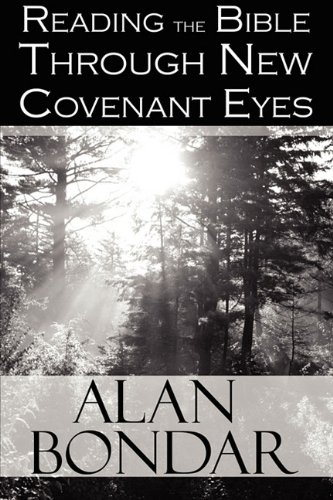by Alan Bondar
★★★★★
This is a very important book, and I beg all Christians to read it slowly. It might make you think differently, but there is nothing here to be afraid of, I promise.
I should confess up front that I asked for a review copy of Alan’s book because I have a deep interest in Christian eschatology (the study of the end times). I have written my own book about Revelation (http://www.thewayithappened.com/), and Alan and I both read the Bible more literally than most people. When the scripture says “soon,” we believe it means soon. When Jesus says “within this generation,” we believe Jesus meant his own generation. Yet, though we read the same words with the same literalness, we disagree—quite radically, I might add—about its message. Our two books are polar opposites. And here I am wholeheartedly endorsing Alan’s book. How can that be?
Question: Is the Bible the inerrant, inspired word of God? I personally don’t think of it that way. When I read the scriptures, I see multiple contradictions, differing opinions, human motives, outdated morals, historical inaccuracies, and blatant evangelizing. This is not to say I don’t consider the Bible the most influential and miraculous piece of literature in the history of the world; I do, and I’m greatly inspired by it. I just don’t read it as inerrant scripture.
My approach to interpreting scripture is sometimes called the historical-critical method. This method seeks to uncover the meaning and setting of each passage without resorting to supernatural suppositions. For example, Revelation refers directly to several events that happened during the Jewish war of 66-70 A.D. So, quite naturally, I conclude it must have been written after the war. How else could its author write about what happened?
There is a second way to read the Bible. If read through the eyes of a believer, one who finds that the Bible is prophetic and inerrant, then the logical conclusion is that Revelation could have only been written before the events it describes, since it seems to promote itself as prophecy.
Enter Alan Bondar’s book, Reading the Bible Through New Covenant Eyes. Another equally descriptive title may be Reading the Bible Through Believer’s Eyes. Bondar is a believing Christian who writes under the assumption that the Bible is both holy and inspired—and entirely written before the destruction of the Temple in 70 A.D. Now, I don’t often take sides like this in my book reviews, but I consider myself a scholar of Revelation and first-century eschatology, and here is my conclusion: If Bondar is right about the Bible’s inerrancy and traditional authorship (a big if, but I know many of you share this belief with him) then there is only one way to interpret the Bible as a whole, and Bondar has nailed it. His interpretation remains true to the spirit of urgency throughout the New Testament. Take this to the bank from an impartial judge (yeah, that’s me, the agnostic Christian): If the Bible is everywhere consistent, Bondar’s careful research has uncovered the most logical and contextual way to read it. Deep study of the Bible has turned him into a full preterist: a person who believes God’s promise of a new age, as described in books like Revelation, was fully realized in the first century.
Preterism is a branch of Christianity that believes most of the prophecies and covenantal promises have been fulfilled. Armageddon is over. Full Preterism, Bondar style, carries this to extremes: It’s all been fulfilled. Christ has already come back, the earth is not going to be destroyed, the general resurrection has happened.
Let’s get right to the dirt: Jesus promised he was coming back immediately. Futurists point out that Jesus never came back, and conclude he must not have really meant “immediately.” Full Preterists point out that Jesus clearly said “immediately,” many times in many ways, and conclude Jesus must have somehow already come back. Oh, and irritants like me point out that the writers of the New Testament could have been mistaken in their beliefs, but let’s ignore the irritants for now.
So, how and when did Jesus come back? What about the general resurrection? Has death been abolished as promised? Did the final judgment occur? These are all questions that Bondar answers with simplicity, consistent with the teachings of the Bible. Well, with one exception: I confess Alan Bondar’s explanation of the millennium, the thousand year reign of Christ, seems weak to me.
I was disappointed that this book does not discuss the external evidence of Preterism. That is, the events of 66-70 A.D. that map directly to the story in Revelation. But I’ve read several great Preterist books, and I’ll try to do a review on one or two in the near future. Besides, for Bondar to exhaustively argue his case would take a book twice the size of this one, and obscure its real value: that of bridging the misunderstanding of many Christians, that Preterism is some kind of wacky uprising to destroy one’s hope, and showing it to be just as “Christian” as orthodox beliefs.
Let me leave you with some advice: If you are content in your belief that the Bible is imperfect, read my book and don’t let Alan corrupt you. If you are a literal believer in the Bible, pick up Alan’s book and don’t touch mine with a ten foot pole. And if you are happy with your creedal, orthodox version of Christianity, burn both books and keep scanning the skies for Jesus to return on the clouds.


Comment
Comments are closed.